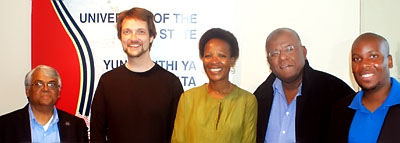Latest News Archive
Please select Category, Year, and then Month to display items
11 January 2021
|
Story André Damons
|
Photo Supplied
 Dr Ralph Clark
Dr Ralph Clark
The Afromontane Research Unit (ARU), the flagship research group of the University of the Free State (UFS) Qwaqwa Campus, has recently been granted R8,4 million to establish a Risk and Vulnerability Science Centre programme.
The Risk and Vulnerability Science Centre (RVSC) programme was established by the Department of Science and Innovation (DSI) as part of the Global Change Research Plan for South Africa and is funded by the DSI through the National Research Foundation (NRF). The RVSC will focus on the need to generate and disseminate knowledge about risk and vulnerability on global change challenges faced by local policy makers/ governance structures and communities in South Africa.
Invited to participate
Dr Ralph Clark, Director of the ARU, says the UFS, together with the University of Zululand and the Sol Plaatje University, has been invited to participate in Phase 2 of the RVSC programme. Dr Clark was approached by the DSI (on referral from the South African Environmental Observation Network – SAEON) in February 2020 regarding the potential for establishing a RVSC at the UFS Qwaqwa campus.
Subsequent interactions were held between the UFS and DSI, and in March 2020, the UFS formally accepted the DSI invitation. It has since been agreed that the RVSC: UFS will be hosted as a RVSC under the ARU umbrella, with dedicated personnel embedded at the UFS in this regard (internal processes and reporting) but reporting directly to the NRF regarding the RVSC.
Interest and support welcomed
Dr Clark welcomed this interest and support from the DSI-NRF, saying that the funds will further assist the UFS in growing its excellent and growing research portfolio and building more research capacity on this traditionally undergraduate-focused campus. “The RVSC will contribute to much-needed solutions in an area marked by major sustainability challenges and will assist in moving Phuthaditjhaba away from its negative apartheid history towards becoming a sustainable African mountain city,” says Dr Clark.
New York academic pays visit to UFS
2010-08-02
 |
Prof. Teboho Moja, a professor of Higher Education at NYU, paid a successful visit to the UFS. Here are, from left: Mr John Samuel, Interim Director: International Institute for Studies in Race, Reconciliation and Social Justice, UFS; Dr Bryan Urbsaitis, Assistant-Director of Study Abroad, Pace University, USA; Prof. Moja; Prof. Jonathan Jansen, Rector and Vice-Chancellor, UFS; and Dr Olihile Sebolai, Directorate Research Development, UFS.
Photo: Arthur Johnson
|
|
Prof. Teboho Moja, a professor of Higher Education from New York University (NYU), paid a fruitful visit to the University of the Free State (UFS). During her visit Prof. Moja, who is originally from South Africa, engaged with various stakeholders to further strengthen relations between the UFS and NYU.
Prof. Moja’s research focus is on the change in higher education and the implications of globalisation on higher education systems. As part of her visit to the UFS, Prof. Moja delivered a public lecture, entitled “Diversity oriented transformation for Teaching and Learning”. The lecture was presented by the Directorate Research Development and the International Institute for Studies in Race, Reconciliation and Social Justice.
Prof. Moja studied at the University of the Witwatersrand and obtained her Doctorate in Philosophy at the University of Wisconsin-Madison in the United States of America (USA).
In 1998 she became the first black woman to be appointed as chairperson of the council of the University of South Africa (UNISA). She is also an honorary professor at the University of Pretoria (UP).
On her visit to the UFS Prof. Moja was accompanied by Dr Bryan Urbsaitis from Pace University in New York and Ms Gina Canterucci from NYU. She also led a group of postgraduate students in International Education Studies. These students interacted with fellows from the Grow Our Own Timber Programme of the UFS. The interaction greatly contributed towards enhancing both student groups’ acuity on academic and social matters.
|